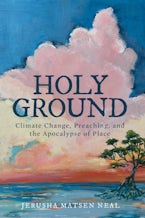Through compassionate listening and vulnerable conversation, Neal fashions a homiletic of place that calls for preaching God’s presence even in the most desolate realities. Masterfully integrating creation theology and Ezekiel’s exilic hope, Neal puts the truths of climate catastrophe in every pulpit as necessary proclamation. Preachers will be both challenged and empowered by Neal’s proposal to view preaching as a matter of life and death for the sake of ecological justice.
~Rev. Karoline M. Lewis, Professor and Marbury E. Anderson Chair of Biblical Preaching, Luther Seminary
This courageous book explores homiletical truth-telling in solidarity with climate refugees and communities enduring the consequences of ecological catastrophe. Attending to the prophetic witness of Ezekiel and the preaching of Fijian Methodist leaders, Jerusha Neal weaves a riveting narrative of resistance to globalizing exploitation and naïve environmentalism, crafting her homiletical approach through a holistic theology of place and an astute ethnographic sensibility. Neal calls practical theologians to a posture of radical relationality that honors diverse Indigenous perspectives on place and dislocation, spiritual and geopolitical causes of climate change, and covenantal hope. Generative and beautifully written!
~Carolyn J. Sharp, Professor of Homiletics, Yale Divinity School
Jerusha Neal has written a necessary book. The analysis of our time she provides is sharp and illuminating, and her writing is clear and compelling. If you have wondered what churches have to say to the multiple crises that climate change represents, read this book.
~Norman Wirzba, Gilbert T. Rowe Distinguished Professor of Theology, Duke Divinity School
Jerusha Neal’s Holy Ground transports readers to a place many of us living in North Atlantic regions have little knowledge of. It successfully demonstrates how listening to voices from Fiji and neighboring islands can teach those of us not from there about prophetic and ecologically sound preaching. Her commitment to the specificity of that place, her dedicated relationship-building with its dwellers, and her deep dive into the biblical interpretation of Ezekiel to shed light on Fijian contexts show her commitment to that place and its people. But her complexifying engagements with theological, postcolonial, and Indigenous topics on sovereignty, belonging, and loss powerfully resonate with global problems that all preachers, albeit from different locations, must face today. Readers will be also equally delighted to see sermon examples regarding how to tackle the climate crisis. Holy Ground is a much-needed excellent addition to ecological homiletics.
~HyeRan Kim-Cragg, Principal and Timothy Eaton Memorial Church Professor in Preaching, Emmanuel College, Toronto School of Theology, University of Toronto
A world of rising seas, burning forests, imperial extractions, forced migrations, and border walls requires a different kind of preaching. This book points the way to a genuinely apocalyptic homiletic. It is not just addressing issues. It is born of deep, personal encounters with these crises--and with preachers in Fiji who are already addressing them, and with the searing visions of Ezekiel. The result is a book unlike any other. It is a book we preachers need.
~Ted A. Smith, Charles Howard Candler Professor of Divinity, Candler School of Theology, Emory University
In this remarkable study, Jerusha Matsen Neal draws on the homiletical wisdom of Fijian Methodist preachers and the exilic prophet Ezekiel to offer a critical exploration of Christian proclamation amid the climate catastrophe. Among other things, the book presents a covenantal reframing of place as relational, formational, and sacramental, which holds significant implications for Western economic policies, theological pedagogies, and the practice of preaching. A major contribution.
~E. Trey Clark, Assistant Professor of Preaching and Spiritual Formation, Fuller Theological Seminary

